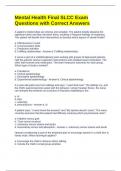-
1. Exam (elaborations) - Anatomy slcc exam questions and answers latest update
-
2. Exam (elaborations) - Bio 1610 slcc exam 2 questions with correct answers
-
3. Exam (elaborations) - Biology 1010 slcc summer semester exam questions with correct answers
-
4. Exam (elaborations) - Cmcn-1013 exam 1 slcc questions and answers
-
5. Exam (elaborations) - Economics 1740 final slcc exam questions and answers
-
6. Exam (elaborations) - Environmental science - slcc rasch exam 1 questions with latest update
-
7. Exam (elaborations) - Exam 2 music slcc exam questions with latest update
-
8. Exam (elaborations) - Med surg midterm slcc exam questions with correct answers
-
9. Exam (elaborations) - Mental health final slcc exam questions with correct answers
-
10. Exam (elaborations) - William speer slcc fall bio 1610 exam 3 questions and answers
-
11. Exam (elaborations) - The human body an orientation exam questions with latest update
-
12. Exam (elaborations) - Test #3, sociology slcc exam questions and answers
-
13. Exam (elaborations) - Slcc physiology exam questions with complete solutions
-
14. Exam (elaborations) - Slcc physiology exam 3 (ch. 12-16) questions with complete solutions
-
15. Exam (elaborations) - Slcc physiology exam 1 questions with latest update
-
16. Exam (elaborations) - Slcc pathophysiology final exam questions with correct answers
-
17. Exam (elaborations) - Slcc pathophysiology final 2024-2025 exam questions and answers
-
18. Exam (elaborations) - Slcc pathophysiology exam questions and answers
-
19. Exam (elaborations) - Slcc pathophysiology exam 4 questions with correct answers
-
20. Exam (elaborations) - Slcc pathophysiology - unit 2 integrative body functions exam questions and answers
-
21. Exam (elaborations) - Slcc nursing ~med-surg 3 ~unit 3 exam questions and answers
-
22. Exam (elaborations) - Slcc microbiology final review exam questions and answers
-
23. Exam (elaborations) - Slcc mental health final review exam questions with correct answers
-
24. Exam (elaborations) - Slcc medical terminology final exam questions and answers
-
25. Exam (elaborations) - Slcc medical terminology exam questions with correct answers
-
26. Exam (elaborations) - Slcc med surg 2 exam questions and answers
-
27. Exam (elaborations) - Slcc human physiology exam 4 questions and answers
-
28. Exam (elaborations) - Slcc human anatomy exam 1 study guide questions and answers
-
29. Exam (elaborations) - Slcc health assessment exam 1 study guide questions and answers
-
30. Exam (elaborations) - Slcc health assessment exam 1 questions and answers
-
31. Exam (elaborations) - Slcc health assessment exam 1 questions and answers
-
32. Exam (elaborations) - Slcc fundamentals of nursing-module 1 exam questions and answers
-
33. Exam (elaborations) - Slcc exam 3 questions with verified answers
-
34. Exam (elaborations) - Slcc exam 3 chap 6, 17-19 questions and answers
-
35. Exam (elaborations) - Slcc college algebra 1050 final exam questions with correct answers
-
36. Exam (elaborations) - Slcc biology 1090 unit 1 exam questions and answers
-
37. Exam (elaborations) - Slcc biol 2320 unit 2 exam questions with verified answers
-
38. Exam (elaborations) - Slcc biol 2320 exam 1 questions with latest update
-
39. Exam (elaborations) - Slcc basic pharmacology exam questions and answers
-
40. Exam (elaborations) - Slcc anatomy test 1 review exam questions and answers
-
41. Exam (elaborations) - Slcc anatomy test #4 exam questions and answers
-
42. Exam (elaborations) - Slcc anatomy lab exam 1 study questions and answers
-
43. Exam (elaborations) - Slcc anatomy final exam review questions with correct answers
-
44. Exam (elaborations) - Slcc anatomy 2320 test #2 exam questions and answers
-
45. Exam (elaborations) - Slcc 2425 - physiology lab final exam questions with latest update
-
46. Exam (elaborations) - Slcc 2420 physiology final exam questions and answers
-
47. Exam (elaborations) - Slcc 2325 anatomy lab final exam questions with correct answers
-
48. Exam (elaborations) - Slcc 1610 exam 2 questions and answers
-
49. Exam (elaborations) - Review for exam 1 speers biology 1610 slcc questions and answers
-
50. Exam (elaborations) - Pathophysiology final slcc exam questions and answers
-
Show more




